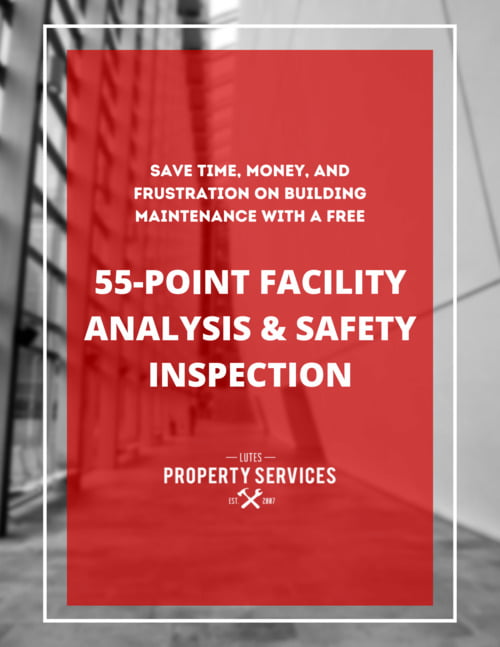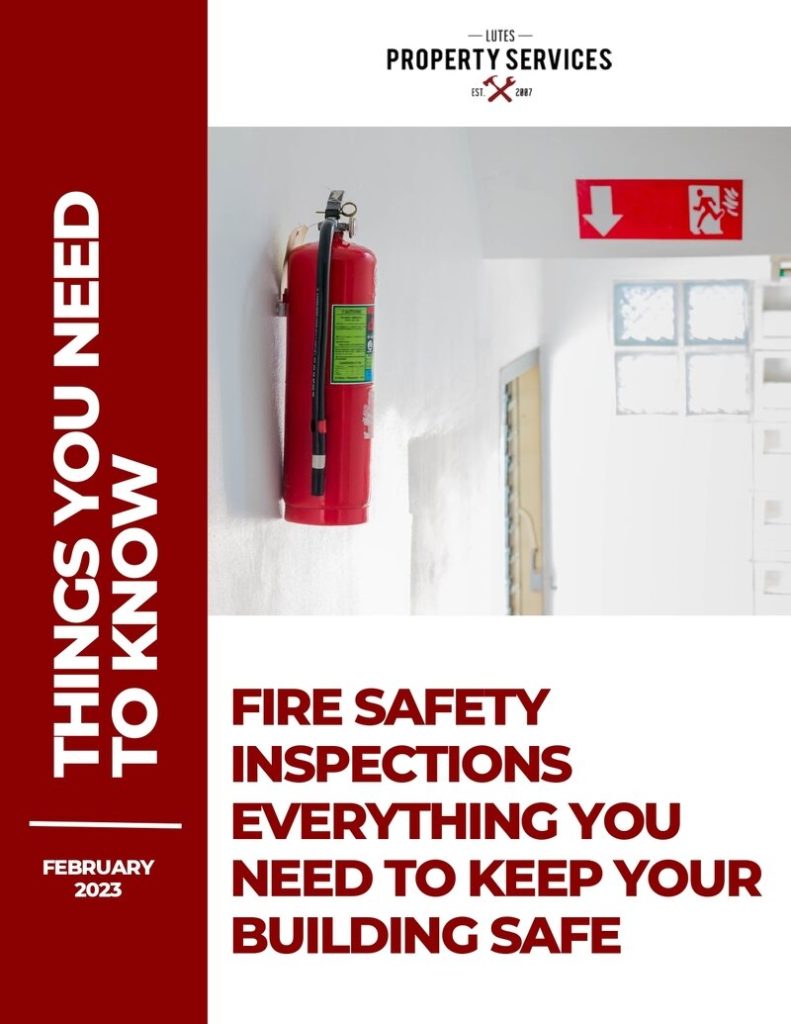Introduction
At Lutes Property Services, we understand the importance of regular maintenance for commercial HVAC systems. Properly maintained heating, ventilation and air conditioning (HVAC) systems are essential to ensure comfortable indoor temperatures, maintain humidity levels and improve air quality. Different types of HVAC systems are suitable for different situations and sizes of buildings depending on the complexity and size of the space.
Regular inspections should be conducted to ensure efficient system design, check electrical connections and wires, test safety controls, and complete an indoor air quality test. Doing this helps prevent unexpected damage or system failure while also improving air quality by replacing air filters regularly.
Definition of HVAC
HVAC stands for Heating Ventilation Air Conditioning. It is a system that provides thermal comfort in buildings by controlling the temperature, humidity and air quality within a space. It is used in both residential and commercial spaces to regulate the environment inside buildings to provide comfortable conditions for occupants.
Purpose of HVAC
The main purpose of an HVAC system is to maintain comfortable temperatures indoors all year round regardless of outside weather conditions. It also helps reduce humidity levels in hot climates, as well as improve air quality by filtering out dust particles, pollen, smoke and other pollutants from the air circulating inside a building.

Different Types of HVAC Systems
Different types of HVAC systems are available depending on the size and complexity of a building’s space needs – from small split systems to large multi-split systems or VRF/VRV systems (Variable Refrigerant Flow/ Variable Refrigerant Volume). The type chosen should depend on factors such as budget, energy efficiency requirements, noise level considerations etc., so it’s important to consult with an experienced professional when deciding which type is right for your project or building space needs.
VRF/VRV Systems
Variable Refrigerant Flow (VRF) and Variable Refrigerant Volume (VRV) systems are two of the most popular HVAC systems for commercial buildings. These systems are ideal for large, complex spaces that require precise temperature control and energy efficiency. They are designed to provide a comfortable environment while also conserving energy costs.
What are VRF and VRV Systems?
VRF/VRV systems are an advanced form of air conditioning technology that use refrigerant as the medium for cooling or heating. The system uses multiple indoor units connected to one outdoor unit, which allows for individual temperature control in each room or area. This makes it perfect for large commercial spaces with multiple rooms or floors, such as office buildings, hotels, schools, and hospitals. The system is also capable of providing both heating and cooling simultaneously, making it a great choice for climates with fluctuating temperatures throughout the year.
Benefits and Drawbacks of VRF/VRV Systems
The main benefits of VRF/VRV systems include their high energy efficiency, low operating costs, precise temperature control, flexibility in design and installation, and quiet operation. However, these systems can be expensive to install due to their complexity and specialized components. Additionally, they require regular maintenance to ensure optimal performance and prevent costly repairs down the line.
Popularity of VRF/VRV Systems
Despite its drawbacks, the popularity of VRF/VRV systems has been steadily increasing over the years due to its many advantages over traditional HVAC systems. Their ability to provide precise temperature control in large commercial spaces while also conserving energy costs make them an attractive option for businesses looking to reduce their environmental impact while still providing a comfortable environment for their employees and customers.
| System | Benefits | Drawbacks | Popularity |
| VRF/VRV Systems | High energy efficiency, low operating costs, precise temperature control, flexibility in design and installation, and quiet operation | Expensive to install, require regular maintenance to ensure optimal performance and prevent costly repairs down the line. | Steadily increasing due to its many advantages over traditional HVAC systems. |
How Long Do HVAC Systems Last?
When it comes to commercial HVAC systems, the life expectancy of the system is largely dependent on the quality of maintenance and care that it receives. In general, a well-maintained HVAC system can last up to 15 years, whereas an unmaintained one will only last around 10 years before needing replacement or major repairs.
Factors Affecting the Lifespan of an HVAC System
The lifespan of an HVAC system is heavily influenced by several factors, such as the type of system installed, the environment in which it operates, how often it is used and how well it is maintained. The type of system installed will determine its expected lifespan; for example, a VRF/VRV system typically has a longer lifespan than other types of systems due to its advanced technology and energy efficiency. The environment in which the system operates can also affect its life expectancy; if the space is prone to dust and dirt buildup or is located in an area with extreme temperatures, then this can cause premature wear and tear on the system components over time. Finally, regular maintenance and use are essential for prolonging the life of any commercial HVAC system.
Regular Maintenance for Prolonged Lifespan
Regular inspections should be conducted to ensure efficient system design, check electrical connections and wires, test safety controls and complete an indoor air quality test. This will help to prevent costly repairs, unexpected damage or system failure while also improving air quality by replacing air filters regularly. Regular maintenance can help to keep your HVAC system running efficiently and effectively for many years by ensuring all components are functioning properly and not showing signs of wear or damage. Additionally, regular maintenance checks can help to identify potential problems before they become serious issues that require expensive repairs or replacements.
System Diagnostic Checks and Electrical Connection Tests
System diagnostic checks are important for identifying any potential problems with your commercial HVAC system before they become serious issues that require costly repairs or replacements. These checks should include inspecting all electrical connections and wires for any signs of corrosion or damage; testing safety controls such as pressure switches and thermostats; checking refrigerant levels; cleaning condenser coils; lubricating moving parts; testing motors; checking ducts for leaks; inspecting blowers; checking belts for wear; testing fans; inspecting evaporator coils; examining insulation levels; checking compressors; cleaning burners; testing heat exchangers; checking gas lines for leaks; inspecting filters for dirt buildup; checking valves for proper operation; testing exhaust fans and more. All these tests should be performed on a regular basis in order to ensure optimal performance from your commercial HVAC system throughout its lifetime.
Indoor Air Quality Test
In addition to regular maintenance checks, an indoor air quality test should also be done periodically in order to ensure that your commercial space is free from harmful pollutants such as mold spores, dust mites, pollen particles or pet dander that can cause respiratory issues in employees or customers who frequent your business premises. An indoor air quality test will measure different parameters such as temperature, humidity levels, carbon dioxide levels and airborne particulate matter so that any necessary steps can be taken in order to improve air quality within your business premises if needed.
E Cost-Saving Measures Through Regular Maintenance
Regular maintenance is essential for ensuring optimal performance from your commercial HVAC system while also helping you save money in the long run by preventing costly repairs or replacements due to unexpected damages caused by lack of maintenance checks over time. By conducting regular inspections on all components of your commercial HVAC systems such as electrical connections and wires, safety controls and completing indoor air quality tests regularly – you can help avoid expensive repair costs while also ensuring comfortable temperatures indoors while mitigating humidity levels and improving air quality throughout your business premises at all times!
Main Idea: Regular maintenance is essential for prolonging the lifespan and optimal performance of commercial hvac systems . Key findings: Quality of maintenance affects lifespan; Type of system, environment, and use all factor in; System diagnostic checks, electrical connection tests, and indoor air quality tests must be conducted regularly to save money.
Improve Air Quality
At Lutes Property Services, we understand the importance of regular maintenance for commercial hvac systems. Keeping air filters clean and in good condition is essential to ensuring a comfortable environment and improved air quality. Regular inspections and cleaning of air filters will help to prevent costly repairs, unexpected damage or system failure while also improving air quality by replacing air filters regularly.
Cleaning and Inspections for Air Filters
air filter cleaning and inspections should be conducted at least once a year, depending on usage. The purpose of these inspections is to ensure that the HVAC system is running efficiently and safely. During the inspection, our experienced technicians will check electrical connections and wires, as well as test safety controls. We also recommend conducting an indoor air quality test to further improve air quality.
Avoidance of Costly Repairs
Regular maintenance can help to prevent costly repairs down the line due to improper operation or lack of upkeep. Our team can inspect your HVAC system for any signs of damage or wear-and-tear that could lead to an expensive repair bill if left unchecked. By catching any potential issues early on, you can save yourself time and money in the long run.
Comfort Level Improvement for Employees and Customers
A well-maintained HVAC system ensures that your employees and customers stay comfortable throughout their visit or shift. A properly functioning HVAC system will be able to maintain a consistent temperature indoors regardless of external conditions, ensuring that everyone stays comfortable no matter what the weather is like outside.
Professional Teams to Repair Heating or AC System Issues
If you experience any issues with your heating or cooling system, our team at Lutes Property Services can provide prompt service from experienced professionals who are knowledgeable about all types of commercial hvac systems. Our technicians are equipped with the latest tools and technology to quickly diagnose any problems you may encounter with your system so that it can be repaired as soon as possible.
Health Benefits from Improved Air Quality
Improved air quality due to regular maintenance has numerous health benefits, including reducing allergies, asthma symptoms, headaches, fatigue, nausea, dizziness, shortness of breath and other respiratory illnesses caused by poor indoor air quality. Additionally, a well-maintained hvac system helps reduce energy costs by eliminating inefficient operation or malfunctioning parts that require more energy than necessary to operate correctly.
Summary of Benefits from Regular Maintenance
In summary, regular maintenance of commercial HVAC systems is essential for ensuring comfortable temperatures inside buildings while mitigating humidity levels and improving overall air quality. Cleaning and inspecting air filters regularly helps avoid costly repairs while providing health benefits from improved indoor air quality. Professional teams such as Lutes Property Services are available to provide emergency services as well as routine maintenance checks in order to keep your building’s HVAC system running efficiently all year round.
Conclusion on the Importance of Commercial HVAC Maintenance
At Lutes Property Services we understand how important it is for businesses to have a properly functioning HVAC system in order to ensure comfort levels inside buildings remain consistent throughout the year while also improving overall indoor air quality through regular maintenance checks. Our team is committed to providing top-notch service when it comes to maintaining commercial-building solutions so that you can rest assured knowing your building’s heating and cooling needs are taken care of every step of the way!


